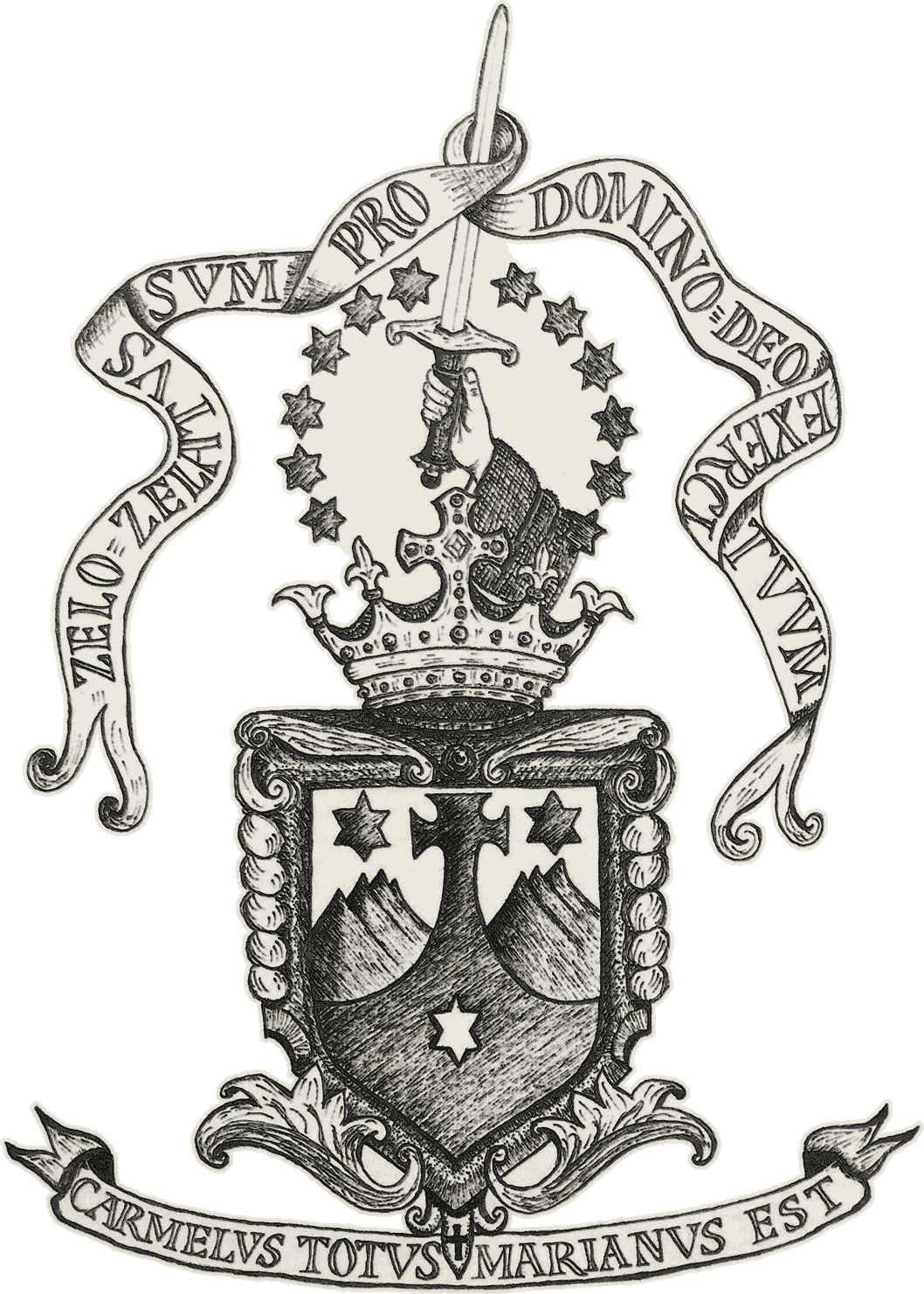In every Carmelite cell hangs a rugged wooden cross with three metal nails. 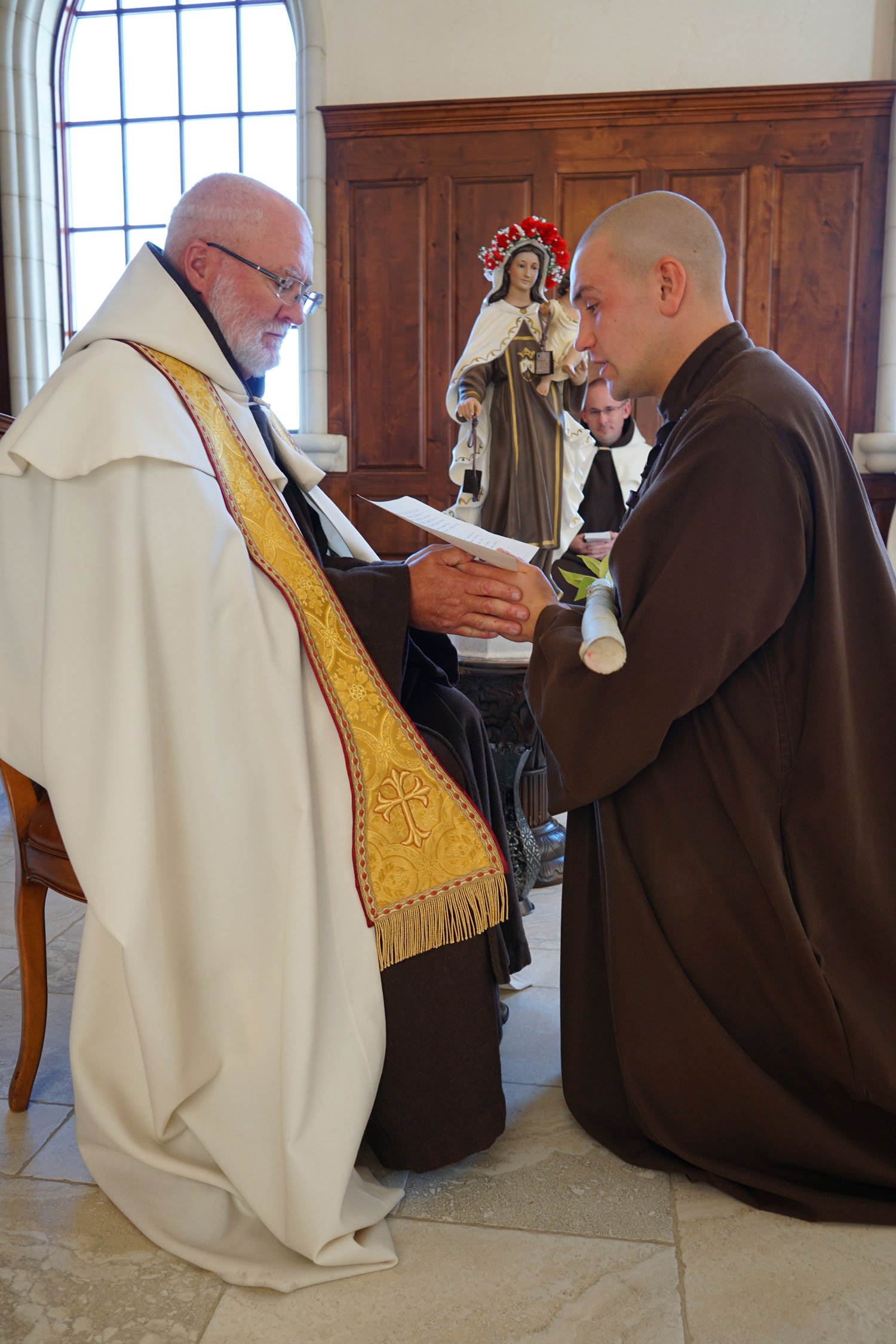 According to the Carmelite tradition, absent from the cross is an image of the Crucified Christ. Many a candidate to the Carmelite vocation has paused before the naked cross, curious why the ancient tradition does not depict Jesus Crucified, instead preferring a bear cross in each Carmelite's bedroom. The solution to this modern question before a longstanding and venerable tradition received from the intrepid Carmelite reformers, Ss. Teresa of Jesus and John of the Cross, is that the Carmelite himself is called to hang on the cross of Christ. The evangelical counsels of obedience, chastity, and poverty affix the Carmelite to the cross moment by moment, day by day, configuring the consecrated monk ever closer to the image of the God-Man, Jesus Christ.
According to the Carmelite tradition, absent from the cross is an image of the Crucified Christ. Many a candidate to the Carmelite vocation has paused before the naked cross, curious why the ancient tradition does not depict Jesus Crucified, instead preferring a bear cross in each Carmelite's bedroom. The solution to this modern question before a longstanding and venerable tradition received from the intrepid Carmelite reformers, Ss. Teresa of Jesus and John of the Cross, is that the Carmelite himself is called to hang on the cross of Christ. The evangelical counsels of obedience, chastity, and poverty affix the Carmelite to the cross moment by moment, day by day, configuring the consecrated monk ever closer to the image of the God-Man, Jesus Christ.
There exists no religious life without the evangelical counsels, so integral are the vows of obedience, chastity, and poverty to what it means to be a religious.
The monk follows Christ in obedience, chastity, and poverty and thus offers an urgently needed witness to the Church and to the world of the life lived by the Incarnate Word of God and by Mary, His Immaculate and ever-Virgin Mother. By means of the profession of the vows of obedience, chastity, and poverty (first for three years at temporary profession and thereafter until death), the monk makes a complete gift of his entire being, body and soul, to Almighty God through the ministry of the Church. By way of the faithful living of the vows, the monk imitates the Lord, witnessing to the radical following of Christ and beginning to live here and now the life of heaven in expectant longing.
When a Carmelite refers to the three vows of obedience, chastity, and poverty, he references them in an order different from that found in other religious institutes by speaking first of obedience, then of chastity, and finally of poverty. While all three vows are necessary for the observance of the religious life, Carmelites have immemorially found in the vow of obedience the other two vows of chastity and poverty. Whereas poverty concerns the use and disposition of temporal goods and chastity the use of man's body, obedience concerns man's higher faculties of intellect and will. The Carmelite Rule, wherefore, necessarily begins with the vow of obedience, the most difficult of the vows, since it is not merely a mechanical fulfillment of what is asked, but rather a continual disposition of the mind and heart that seeks to know and to do God's Will as manifested through one's legitimate superior. Following St. Bernard of Clairvaux, St. Teresa of Jesus affirms that without obedience it is impossible to be a monk. The faithful observance of the vows of obedience, chastity, and poverty after the example of Jesus and Mary, and as envisioned by the Discalced Carmelite reformers, necessitates a life of continual conversion and transformation through grace.
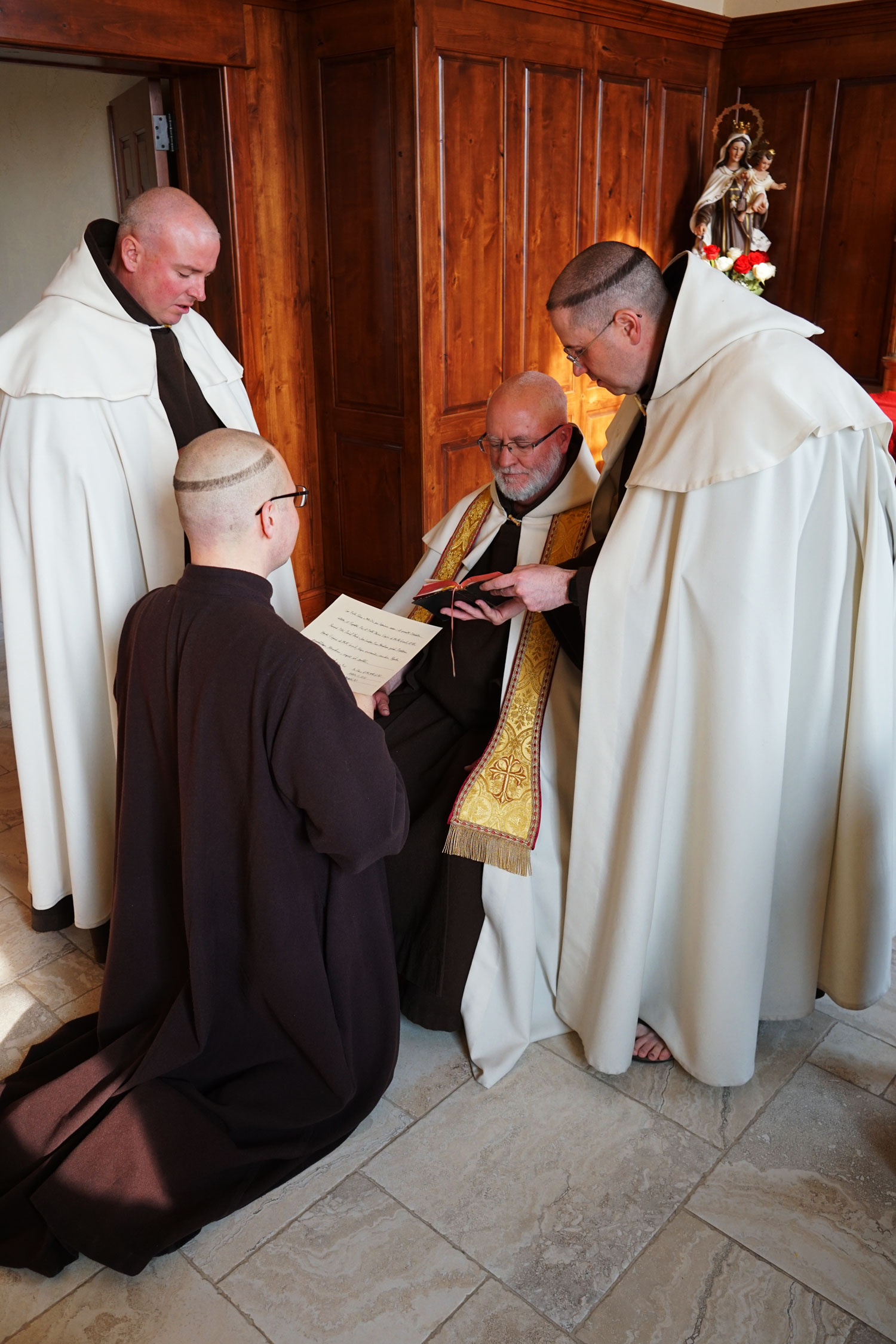
Obedience, chastity, and poverty are not, however, ends in themselves, but rather a means to the perfection of charity towards which the evangelical counsels are ordered. Obedience reveals how the monk is to concretely exercise charity in the quasi-infinite circumstances of daily life and routine interactions. Chastity manifests a love that is pure and selfless, enjoying a fecundity or fruitfulness in the mystical order of grace. Finally, poverty allows the religious to use the things of this world in a manner that takes into account the needs of others and is rightly ordered to man's end in the beatific vision.
Our Lord Jesus Christ has entrusted the legislation and the observance of the evangelical counsels to the Catholic Church. A monk, wherefore, on his profession day places his trembling hands between the hands of the Prior who receives a monk's vows in the name of the Church. The Church governs the vows and makes the monk a public person of the Church
through the faithful observance of the religious state. By means of the profession of the evangelical counsels, a monk commits himself to forever remain a son of the Church
and to render his obedience in the first place to the Successor of St. Peter.
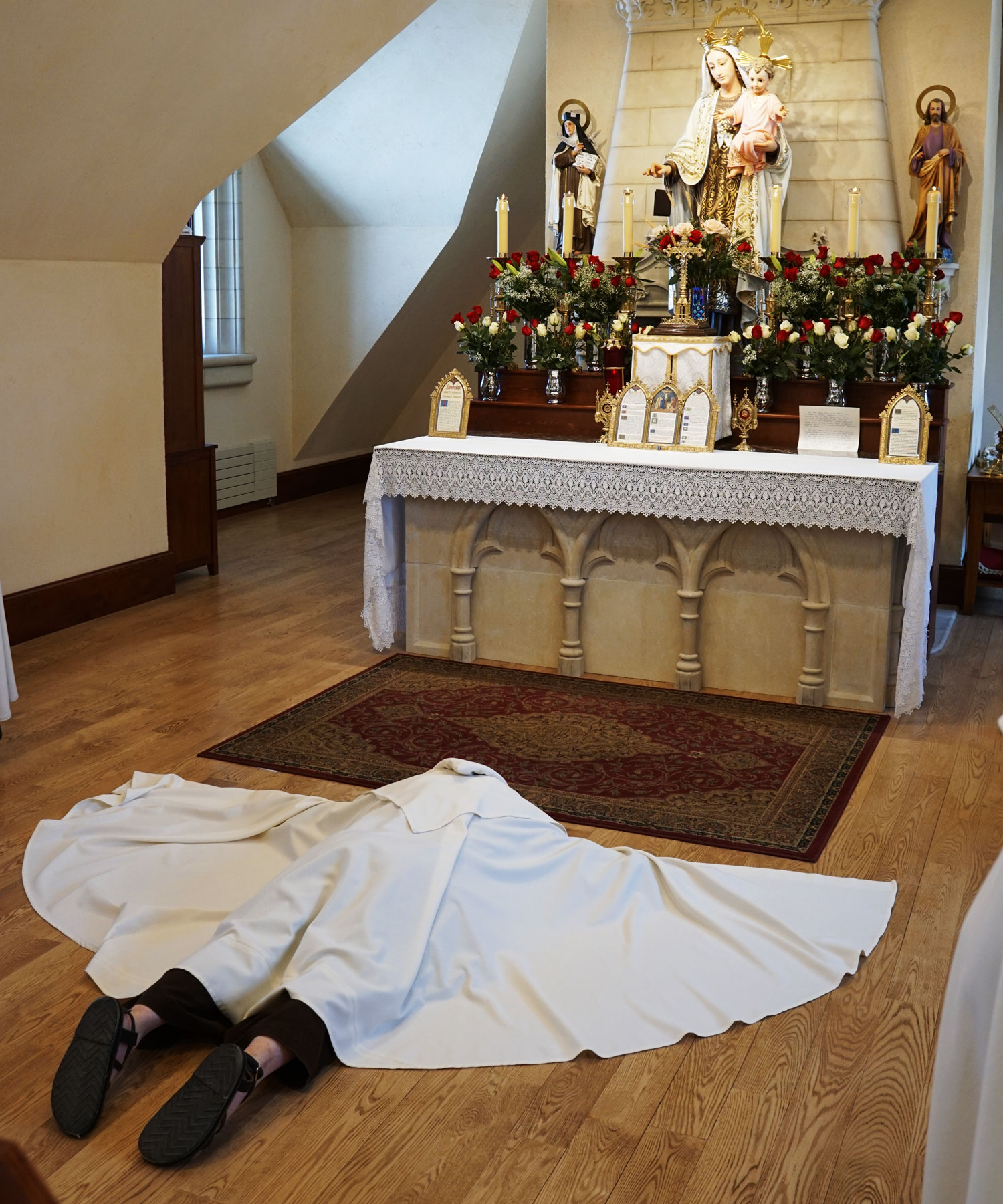
Hidden in the monastery, the question arises concerning the merit of living the evangelical counsels in the modern world. Holy Mother Church has tirelessly defended the excellence of the religious life and its apostolic fruitfulness, particularly a life entirely ordered to contemplation. Although unseen behind the monastery's tall walls and grilles, a monk witnesses to the world of the one thing necessary.
Through perseverance in the spiritual warfare of observing obedience, chastity, and poverty as envisioned by Ss. Teresa of Jesus, John of the Cross, and all of the Carmelite saints, the Carmelite monk opens mighty channels of grace for his spiritual children. The vows of obedience, chastity, and poverty remain timeless not only because of their witness to the Son of God and the Virgin Mother, but also because of their exceedingly great merit in obtaining outstanding graces for the entire world. Indeed, the fecundity of the vows will only be fully grasped in heaven, but what is now certain is that the vows pertain to the virtue of religion and as such offer worship to God. Thus, whether awake or sleeping, amidst the ordinary or the extraordinary, in all things the consecrated monk worships the Triune God.
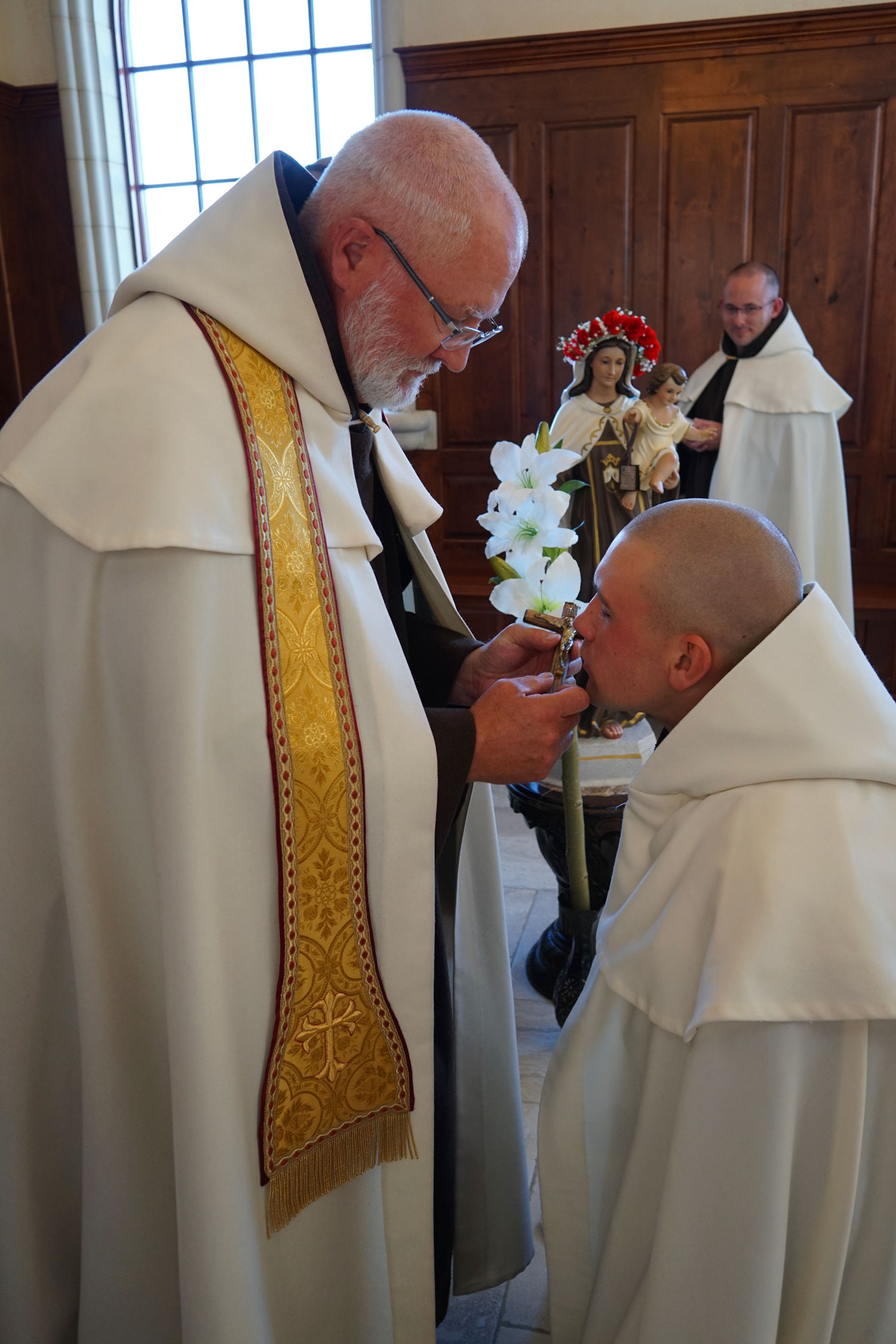
The observance of obedience, chastity, and poverty requires authentic humility and a lifelong commitment to continual conversion. Initial formation in consecrated life purposes to instruct postulants and novices on all that the faithful living of the evangelical counsels entails to earnestly discern whether a young man is being called by God to this radical following of the Lord. Once professed, the vows necessitate daily perseverance and a ceaseless striving after perfection following the manner of life received from the Carmelite saints, especially Ss. Teresa of Jesus and John of the Cross. For those who are called to profess the evangelical counsels, the three vows bring indescribable peace and joy, alien to this world in a life that is more heavenly than earthly. The monk makes his own the words of Psalm 115: What shall I render to the Lord, for all the things he hath rendered unto me?. . . I will pay my vows to the Lord before all his people.
